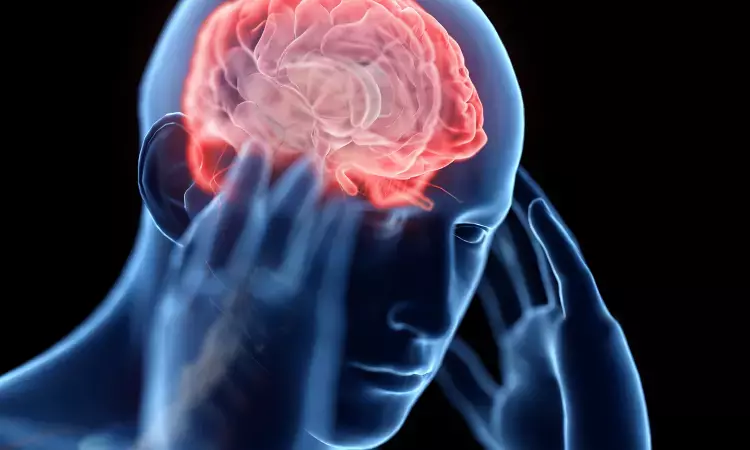- Home
- Medical news & Guidelines
- Anesthesiology
- Cardiology and CTVS
- Critical Care
- Dentistry
- Dermatology
- Diabetes and Endocrinology
- ENT
- Gastroenterology
- Medicine
- Nephrology
- Neurology
- Obstretics-Gynaecology
- Oncology
- Ophthalmology
- Orthopaedics
- Pediatrics-Neonatology
- Psychiatry
- Pulmonology
- Radiology
- Surgery
- Urology
- Laboratory Medicine
- Diet
- Nursing
- Paramedical
- Physiotherapy
- Health news
- Fact Check
- Bone Health Fact Check
- Brain Health Fact Check
- Cancer Related Fact Check
- Child Care Fact Check
- Dental and oral health fact check
- Diabetes and metabolic health fact check
- Diet and Nutrition Fact Check
- Eye and ENT Care Fact Check
- Fitness fact check
- Gut health fact check
- Heart health fact check
- Kidney health fact check
- Medical education fact check
- Men's health fact check
- Respiratory fact check
- Skin and hair care fact check
- Vaccine and Immunization fact check
- Women's health fact check
- AYUSH
- State News
- Andaman and Nicobar Islands
- Andhra Pradesh
- Arunachal Pradesh
- Assam
- Bihar
- Chandigarh
- Chattisgarh
- Dadra and Nagar Haveli
- Daman and Diu
- Delhi
- Goa
- Gujarat
- Haryana
- Himachal Pradesh
- Jammu & Kashmir
- Jharkhand
- Karnataka
- Kerala
- Ladakh
- Lakshadweep
- Madhya Pradesh
- Maharashtra
- Manipur
- Meghalaya
- Mizoram
- Nagaland
- Odisha
- Puducherry
- Punjab
- Rajasthan
- Sikkim
- Tamil Nadu
- Telangana
- Tripura
- Uttar Pradesh
- Uttrakhand
- West Bengal
- Medical Education
- Industry
Good sleep continuity leads to better days for people with dementia

Not only does how well people with dementia sleep affect their symptoms the following day, but of particular significance is their sleep continuity, or the extent which they can stay asleep after initially falling asleep, according to a new study by Brighton and Sussex Medical School (BSMS), the University of Surrey and University of Sussex.
Dr Sara Balouch, former Dementia Research Fellow from the Centre for Dementia Studies at BSMS and lead author of the paper, said: "Our research shows that night-to-night variations in sleep predict day-to-day variations in symptoms of dementia, more so than in people without cognitive impairment. We suggest that it may be possible to optimise time in bed and sleep continuity, to improve daytime symptoms in people living with dementia."
Over a two-week period, researchers assessed sleep in people living with dementia and assessed their daytime cognition and dementia symptoms, such as everyday memory problems. Sleep was assessed both by self-report and objectively by activity monitors placed on the wrist, for this two-week period.
Researchers not only asked the people living with dementia about their sleep but also asked their partners/caregivers to comment on their daily patterns of behaviour.
Detailed analyses of the sleep data indicated that sleep continuity was among the most predictive aspects of next day symptoms. Sleep continuity refers to the extent which one can stay asleep after initially falling asleep. When we spend too much time in bed, however, sleep continuity actually decreases.
It was found that increased sleep continuity was related to feeling more alert, fewer everyday memory errors and fewer carer reported memory and behavioural problems. However, it was also related to reduced ability to conduct a subtraction task the next morning, which the researchers believe might have something to do with sleep inertia (a state of impaired cognitive performance immediately following sleep).
One interpretation of these results is that there is an optimal time in bed such that sleep is sufficiently long and continuous. This interpretation can be tested in interventional studies in which for each person living with dementia the optimal time in bed is assessed and implemented.
To read the full article, click on the following link:
Dr Kamal Kant Kohli-MBBS, DTCD- a chest specialist with more than 30 years of practice and a flair for writing clinical articles, Dr Kamal Kant Kohli joined Medical Dialogues as a Chief Editor of Medical News. Besides writing articles, as an editor, he proofreads and verifies all the medical content published on Medical Dialogues including those coming from journals, studies,medical conferences,guidelines etc. Email: drkohli@medicaldialogues.in. Contact no. 011-43720751


